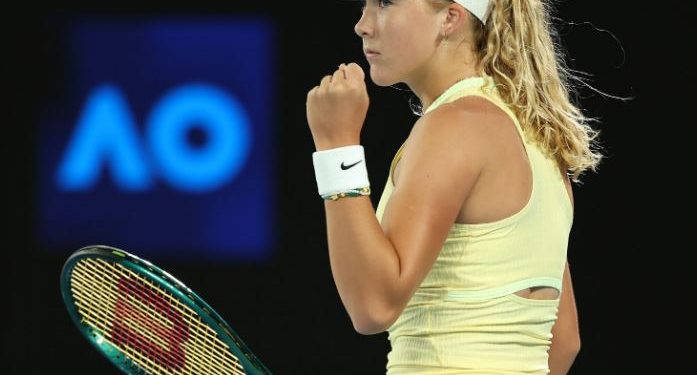Melbourne: When their paths crossed after first-round wins, 16-year-old Mirra Andreeva saw Ons Jabeur make a light-hearted gesture that signaled she could see her.
The three-time Grand Slam runner-up probably didn’t really see what was coming her way at the Australian Open.
The first set was over in 20 minutes. The match was over in 54 minutes Wednesday, with Andreeva advancing to the third round 6-0, 6-2.
“In the first set, I showed amazing tennis,” she said. “I honestly didn’t expect that from myself. I’m super happy with the level that I showed.”
Andreeva went into the tournament knowing that a first main draw win at the Australian Open — completing a Grand Slam set — could pay off with a second-round encounter against one of her childhood tennis inspirations.
Sixth-seeded Jabeur reached back-to-back finals at Wimbledon and the US Open in 2022 and was runner-up at Wimbledon against last year. Andreeva admired the Tunisian star and observed how she approached the sport, on and off the court.
Jabeur is renowned for her drop shots and slice, something that Andreeva wanted to emulate. Her backhand drop shot to earn set points in the first was a classic.
“Yes, I was preparing for this match, and I knew what she was going to do,” Andreeva said. “I’m also not very bad at dropshots (but) I decided at first to not to do a lot of dropshots, because I think that she’s better.
“It was just the momentum when I decided to do a lot. I think she’s still better than me in this, but I will improve!”
That she will. In her only previous match on Rod Laver Arena, Andreeva left the court in tears after a loss to her friend Alina Korneeva in the junior final last year.
“I was just super upset. I didn’t think about anything else,” she said. “For maybe a week I was just replaying the match in my head, and I was thinking: ‘I should have changed this, should have changed that, I should have changed this.”
Then the reality of it struck her; It’s a game of on-court skill, but also of mental resilience.
“It’s not the most painful loss of my life,” she said. “After that, I just moved on.”
She reached the third round at the French Open in her Grand Slam debut and the fourth round at Wimbledon before rounding off the majors with a second-round exit at the US Open.
After being the third of the 16-year-old players into the second round this time, following Korneeva and Brenda Fruhvirtova, Andreeva was the first into Round 3.
Her opening 7-5, 6-2 win over Brenda Pera was her first in the main draw in Australia, making her the youngest player since Coco Gauff in 2000 to win matches at all four majors.
Her win over Jabeur was her first over a player ranked in the top 10, another career milestone.
“I just feel like I’m a bit more mature,” Andreeva said in her on-court TV interview, comparing her two latest trips to Australia. It generated a few laughs and the next obvious remark: but you’re only 16. “That’s true, but last year I was 15! So, in this year I think I changed a lot and I think you can see that on the court.”
In a later news conference, she summed up her progress to date: “I don’t think that I achieved something incredible. I have time still to do that.”
AP







































